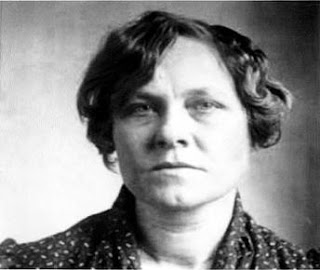En Double
Indemnity el actor Edward G. Robinson
interpreta al especialista en seguros que sospecha de las intenciones de la
esposa de la víctima. Double Indemnity
se basó en el crimen que tuvo lugar en Nueva
York, en el que la esposa, Ruth Snyder, intenta cobrar el
seguro del marido asesinado por su cómplice. El caso tuvo resonancia en
aquellos años, además, porque la mujer es fotografiada al momento de morir en la silla eléctrica (ver más
abajo). Edward G. Robinson no estuvo
seguro de aceptar el papel pues significaba descender un nivel, para ser actor
secundario, cuando ya había protagonizado con éxito en varias películas.
En vocabulario:
gritty, garrote, fluster, forthcoming
Double Indemnity is a 1944 American
psychological thriller film noir
directed by Billy Wilder, and co-written
by Wilder and Raymond
Chandler. The
screenplay was based on James M. Cain's
1943 novella of the same name.
The film stars Fred MacMurray as an insurance salesman,
Barbara Stanwyck as a provocative
housewife who wishes her husband were dead, and Edward G. Robinson as a claims adjuster whose job is to find phony
claims.The term "double indemnity"
refers to a clause in certain life insurance policies that doubles the payout
in rare cases when the death is accidental, such as falling off a train.
 |
| Fred MacMurray and Barbara Stanwyck |
Wilder's first choice for the role of Phyllis
Dietrichson was Barbara Stanwyck.
At the time, Stanwyck was the
highest-paid actress in Hollywood. Given
the nature of the role, Stanwyck was
reluctant to take the part, fearing it would have an adverse effect on her
career.
Many Hollywood actors including Alan Ladd, James Cagney, Spencer Tracy, Gregory Peck, and Fredric March did not accept the offer to star the film. Wilder recalls approaching George Raft. Raft was
illiterate, so Wilder had to tell him
the plot. Raft turned the part down.
James M. Cain based his novella on a 1927 murder perpetrated by a
married Queens, New York, woman and
her lover whose trial he attended while working as a journalist in New York. In that crime, Ruth
Snyder persuaded her boyfriend, Judd
Gray, to kill her husband Albert
after having him take out a big insurance policy – with a double-indemnity clause. The murderers quickly were identified,
arrested and convicted.
Wilder later recalled with disappointment his first meeting with Chandler. Envisioning a former private
detective who had worked his own experiences into gritty prose, he instead met a man he later described as
looking like an accountant. Wilder
informed Chandler that they would be
working together, slowly and meticulously. By all accounts, the pair did not
get along during their four months together.
Para saber
Ruth Brown Snyder was a housewife from Queens, a borough of New York
City, who began an affair with Henry
Judd Gray, a married corset salesman, in 1925. Ruth's distaste for her husband apparently began when he insisted
on hanging a picture of his late fiancée Jessie
Guischard on the wall of their first home, and named his boat after her.
 |
| Ruth Brown Snyder |
According to Gray, Ruth had made at least seven
attempts to kill Albert, all of which
he survived. On March 20, 1927, the couple garrotted
Albert and stuffed his nose full of
chloroform-soaked rags, then staged his death as part of a burglary. Detectives
at the scene noted that the burglar left little evidence of breaking into the
house. Moreover, Ruth's behavior was
inconsistent with her story of a terrorized wife's witnessing her husband being
killed.
Police
discovered that the property Ruth had
claimed had been stolen was still in the house, but hidden. A breakthrough came
when a detective found a paper with the letters "J.G." on it (it was
a memento Albert had kept from former
lover Guischard), and asked Ruth about it. A flustered Ruth's
mind immediately turned to Gray,
whose initials were also "J.G.," and she asked the detective what Gray had to do with the murder. It was
the first time Gray had been
mentioned, and the police instantly became suspicious. Gray was found upstate in Syracuse.
He claimed he had been there all night, but it was eventually found out a
friend of his had set up Gray's room
at a hotel to support his alibi. Gray
proved far more forthcoming
than Ruth about his actions. He was
caught and returned to Queens and
charged along with Ruth.
Ruth and Gray turned on each other, contending the other was
responsible for killing Albert; both
were convicted and sentenced to death.
Ruth
was imprisoned at Sing Sing in Ossining, New York, located thirty miles
north of New York City. On January
12, 1928, she became the first woman to be executed at Sing Sing since Martha Place
in 1899. She went to the electric chair ten minutes before Judd Gray, her former lover. Her execution was caught on film, at
the moment electricity was running through her body, with the aid of a
miniature plate camera strapped to the ankle of Tom Howard, a Chicago Tribune photographer working in cooperation
with the Tribune-owned Daily News.
 |
| Ruth Snyder´s midexecution photo |
Vocabulario
Gritty: strong and determined in dealing with an unpleasant
situation.
Garrote: To strangle in order to rob.
Fluster: to make someone become agitated, nervous or confused.
Forthcoming: friendly, communicative, outgoing, etc.
Fuentes
Double Indemnity (film), From Wikipedia, the free encyclopedia
Artículos relacionados
… her reputation
as a glamorous femme fatale was enhanced by her performance in The Postman
Always Rings Twice … Lana Turner
The rifle was an
anachronism, as the show was set 12 years before John Browning designed any
such rifle… El
Hombre del Rifle
Creo que era algo muy necesario en esa época. Los
radicales iban a apoderarse de nuestros negocios (sobre las listas negras)… John Wayne
Esto es parte del archivo: Robinson, el de la edad de oro de Hollywood
No comments:
Post a Comment